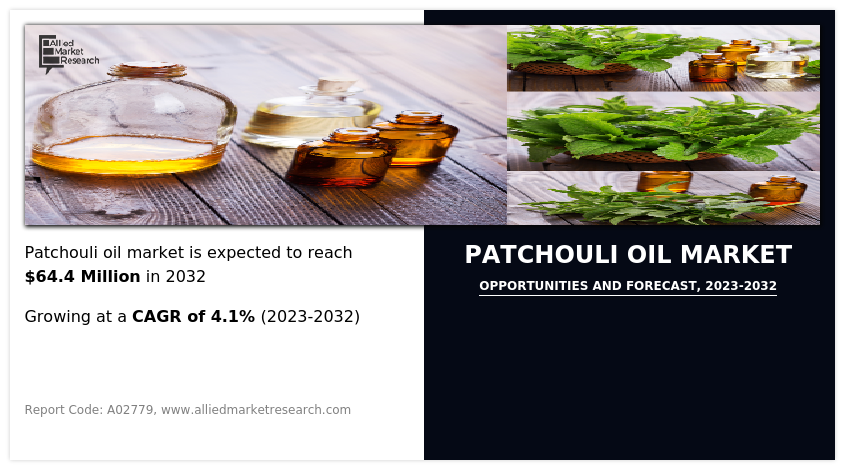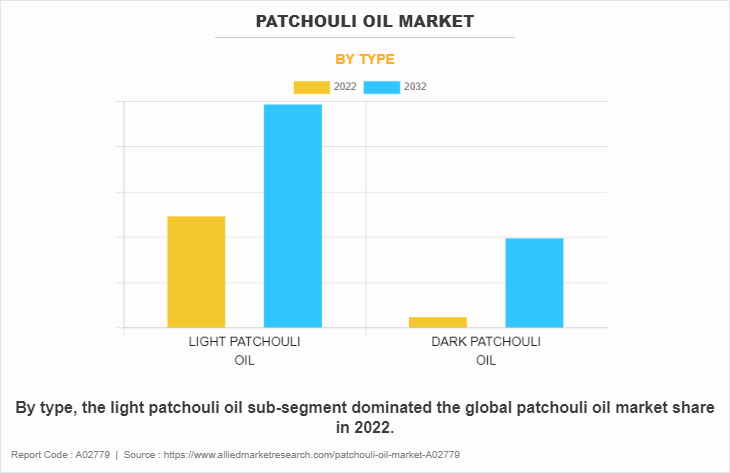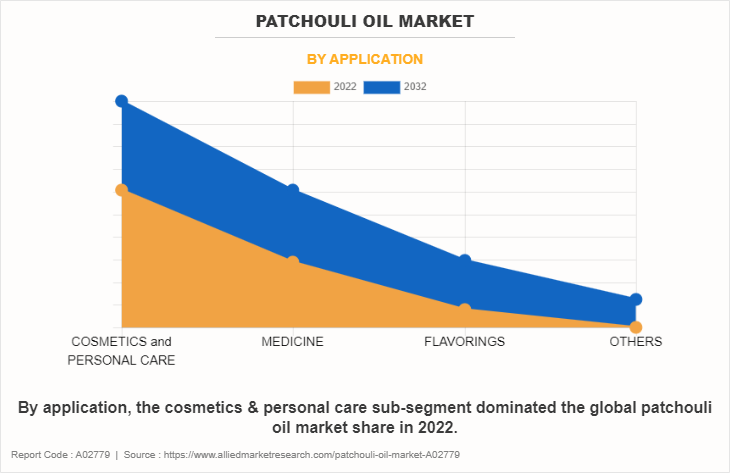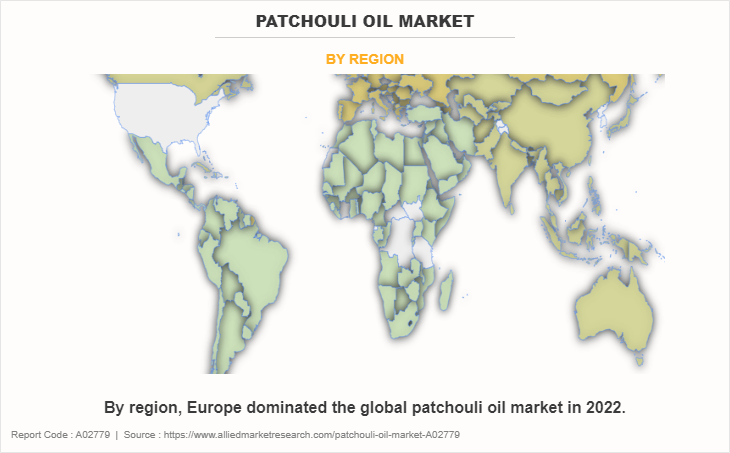Patchouli Oil Market Research, 2032
The global patchouli oil market size was valued at $43.4 million in 2022, and is projected to reach $64.4 million by 2032, growing at a CAGR of 4.1% from 2023 to 2032. Patchouli is a plant from which its pure essential oil is extracted by gathering the leaves. The plant has a maximum height of roughly three feet. The trees that produce patchouli have oblong leaves and pale purple blooms. The plant is distinctive in that it requires direct sunshine in order to release its fragrance. In China, Indonesia, Madagascar, and Japan, patchouli is very common. Patchouli was utilized by Arabs in their homes and beds to ward off lice and fleas. In Latin America, patchouli leaves are consumed and used to treat illnesses. Hence, the use of patchouli has expanded beyond its original application in the perfume business to include incense and complementary medicine.

Patchouli essential oil has therapeutic benefits that have escalated its usage as a peaceful and restful oil. This has enhanced its medicinal effects due to the substance's potent chemical components.. Because of these properties, it is perfect for use in skincare products, aromatherapy, massage oils, and household cleaning solutions that purify the air and surfaces in the home. The oil's beneficial properties, which also include antiphlogistic, anti-inflammatory, aphrodisiac, astringent, cytophylactic, antiseptic, diuretic, cicatrisant, fungicide, deodorant, febrifuge, sedative, and tonic effects, are what cause its medicinal properties. Furthermore, the use of natural remedies by people to relax, ease stress, and enhance their mental wellbeing coincides with the expanding trend. It is thought that the qualities of patchouli oil can help reduce tension, anxiety, and depression. It is a popular choice for aromatherapists and people looking for natural stress relief because of its calming aroma, which is said to promote relaxation and emotional equilibrium. In order to satisfy each client's specific needs, aromatherapists frequently create custom blends of essential oils. In order to create unique scents that suit each person's preferences, patchouli oil can be combined with other essential oils like bergamot, lavender, or frankincense. Aromatherapy plays a vital role in many spa treatments, and the wellness and spa industries are expanding as well.
The leaves of the patchouli plant are mainly used to make patchouli oil. Due to worries about biodiversity conservation, environmental effect, or sustainable practices, strict laws and routine guidelines monitoring may have an impact on the patchouli plant's harvesting, growing, and processing. The supply of raw materials will be hampered as a result of increasing regulatory monitoring, potentially increasing production costs and reducing the overall availability of patchouli oil. Compliance with particular standards and quality control procedures are implemented so as to keep an eye on the cultivation and usage of the oil. The market for patchouli oil may be impacted by the need for thorough testing and documentation of the oil's chemical make-up, purity, and safety. There is a chance that producers will have to spend more money on sophisticated testing tools and methods. Furthermore, because patchouli oil is manufactured mostly in South Asian nations and sold to other nations, admission may be hampered by strict laws in importer nations. These laws may impose compliance with particular labeling standards, certification procedures, or restrictions on the use of specified ingredients. This can hinder market access and slow down the exporting process. Although the strict rules may pose difficulties for the patchouli oil market in the short term, they may eventually lead to a more resilient and superior sector. Despite the initial obstacles, businesses that adopt these standards by adopting sustainable practices, investing in quality control, and staying ahead of compliance needs are more likely to prosper.
Consumers are choosing environmentally friendly and sustainable solutions as a result of increased understanding about the effects of synthetic scent compounds on the environment. Being a natural substance, patchouli oil fits in aptly with this preference. As the market transitions toward natural and organic products, consumers are becoming more interested in perfumes made from natural components, such as essential oils like patchouli oil. This movement is being driven by worries about the synthetic chemicals used in conventional perfumes and their potential implications on both human health and the environment.
Patchouli oil and other rare and distinctive aroma compounds are in demand due to the growth of artisanal and niche perfumery. To stand apart from the competition, these niche, smaller perfume companies frequently place a great priority on premium, natural ingredients. It is crucial to keep in mind, though, that elements like ethical sourcing, quality assurance, and legal compliance also have an impact on the patchouli oil market's performance. Making sure that the patchouli oil supply chain is dependable and morally sound becomes essential as demand rises. Additionally, the patchouli oil market growth has a huge possibility to expand as a result of the growing demand for natural fragrances, especially as consumers look for more sustainable, natural, and distinctive scent options.
The key players profiled in the patchouli oil industry report include PT. Djasula Wangi, Givaudan, Takasago International Corporation, Nusaroma, Firmenich SA, PT. Botanagra Indonesia, Van Aroma, Indesso, Eastern Agencies Aromatics Pvt. Ltd., and Treatt Plc. Product launches and strategic partnership are common strategies followed by major market players. For instance, in March 2023, Givaudan Active Beauty announced a new active component made from recycled materials for hair and scalp care. The novel component was developed to meet demand for products that provide effective advantages while protecting priceless natural resources. The solution with the new component is anticipated to provide benefits such as rebalance sebum production by 39%, smoothly reduce scalp dry flakes by 31%, normalize scalp microbiota, regulate stratum corneum desquamation, and improve scalp condition in 100% of volunteers. The rise in product demand would simultaneously positively influence the patchouli oil market demand, as it is an ingredient of the product.
The patchouli oil market forecast is segmented on the basis of type, application, and region. By type, the market is bifurcated into dark patchouli oil and light patchouli oil. By application, the market is classified into cosmetics & personal care, medicine, flavorings, and others. By region, the market is analyzed across North America, Europe, Asia-Pacific, and LAMEA.
The patchouli oil market is segmented into Type and APPLICATION.

By type, the light patchouli oil sub-segment dominated the global patchouli oil market share in 2022. Light patchouli oil offers a softer, airier sensation while preserving the essence of the classic aroma. As a result, it is the perfect option for anyone who wants patchouli's captivating charm without the overwhelming richness. Different distillation methods that maintain the fragrance's top and middle notes allow for the production of the lighter version of the oil, which has a more harmonious and adaptable perfume. Beyond only having a seductive aroma, mild patchouli oil has several advantages. It is well known that oil has the ability to improve mood, reduce tension, and encourage relaxation. The possibility that its aromatic molecules could have a beneficial effect on the nervous system and contribute to the atmosphere's relaxing effects has been investigated. In addition, patchouli oil is frequently used in aromatherapy because of its purported advantages for skincare. It may help to promote healthy skin and lessen the appearance of blemishes.

By application, the cosmetics & personal care sub-segment dominated the global patchouli oil market share in 2022. The market for cosmetics and personal care products has seen a substantial growth in the use of patchouli oil. In spite of being traditionally renowned for its therapeutic and fragrant properties, patchouli oil is currently being used in inventive and new ways in the beauty and self-care industries. This oil, a preferred component in lotions, fragrances, and skincare products, is treasured for its particular aroma. Its natural, grounded scent not only lends aromas a bit of exoticism, but also provides aromatherapeutic benefits that aid in stress reduction and relaxation. Additionally, the anti-inflammatory, antibacterial, and astringent properties of patchouli oil make it beneficial in cosmetics formulations. It can assist in preventing wrinkles and fine lines as well as treating acne and skin rashes. Additionally, using patchouli oil to cosmetics and personal care products not only adds sensory appeal but also taps into the oil's potential medicinal benefits, promoting overall wellness.

By region, Europe dominated the global patchouli oil market in 2022. Patchouli oil is widely used in Europe. Due to its unique olfactory profile, which can give odors depth and richness, patchouli oil is frequently utilized in colognes, perfumes, and other fragrance items in Europe. Consumer desire for unusual and exotic aromas like patchouli is anticipated to rise as the perfume and cosmetics industries continue to expand. Natural and organic products, including essential oils like patchouli oil, are gaining popularity in Europe. Patchouli oil is one of the many essential oils that have seen a rise in demand as aromatherapy and holistic health methods have gained popularity. Additionally, shoppers are looking for goods that use sustainable and natural components. It is projected that the market growth will be accelerated by patchouli oil when it is ethically sourced and complements these tastes.
Impact of COVID-19 on the Global Patchouli Oil Industry
- The COVID-19 pandemic has had a significant impact on various industries, including the manufacturing industry. The pandemic led to disruptions in global supply chains, affecting the availability and delivery of finished products, and raw materials. This disrupted the operations of patchouli oil companies, causing delays in production.
- With people staying at home and practicing social distancing, there was a significant decrease in demand for fragrance products. The closure of non-essential businesses and the reduced need for cosmetic products further contributed to this decline.
- E-commerce became a crucial channel for cosmetic sales during the pandemic. Cosmetic brands that had a strong online presence were better positioned to reach consumers. However, the emphasis on online shopping also changed the way products were marketed and presented, affecting the way cosmetic pigments were showcased.
Key Benefits For Stakeholders
- This report provides a quantitative analysis of the market segments, current trends, estimations, and dynamics of the patchouli oil market analysis from 2022 to 2032 to identify the prevailing patchouli oil market opportunities.
- The market research is offered along with information related to key drivers, restraints, and opportunities.
- Porter's five forces analysis highlights the potency of buyers and suppliers to enable stakeholders make profit-oriented business decisions and strengthen their supplier-buyer network.
- In-depth analysis of the patchouli oil market segmentation assists to determine the prevailing market opportunities.
- Major countries in each region are mapped according to their revenue contribution to the global market.
- Market player positioning facilitates benchmarking and provides a clear understanding of the present position of the market players.
- The report includes the analysis of the regional as well as global patchouli oil market trends, key players, market segments, application areas, and market growth strategies.
Patchouli Oil Market Report Highlights
| Aspects | Details |
| Market Size By 2032 | USD 64.4 million |
| Growth Rate | CAGR of 4.1% |
| Forecast period | 2022 - 2032 |
| Report Pages | 290 |
| By Type |
|
| By APPLICATION |
|
| By Region |
|
| Key Market Players | Nusaroma, Eastern Agencies Aromatics Pvt. Ltd., Treatt Plc, PT. Botanagra Indonesia, Takasago International Corporation, PT. Djasula Wangi, Van Aroma, PT. INDESSO AROMA, Treatt Plc, Firmenich SA, Givaudan |
The patchouli oil market size is expected to grow due to an increase in demand for cosmetic & personal care products globally. In addition, the market is driven by growth in application in new field like medicine.
The major growth strategies adopted by the patchouli oil market players are product launches and partnership agreements.
Asia-Pacific will provide more business opportunities for the global patchouli oil market in the future.
PT. Djasula Wangi, Givaudan, Takasago International Corporation, Nusaroma, Firmenich SA, PT. Botanagra Indonesia, Van Aroma, Indesso, Eastern Agencies Aromatics Pvt. Ltd., and Treatt Plc., are the major players in the patchouli oil market.
The light patchouli oil sub-segment of the type segment acquired the maximum share of the global patchouli oil market in 2022.
Cosmetic products companies are the major customers in the global patchouli oil market.
The report provides an extensive qualitative and quantitative analysis of the current trends and future estimations of the global patchouli oil market from 2022 to 2032 to determine the prevailing opportunities.
Cosmetics & personal care is expected to experience a growth in adoption, as a popular ingredient in lotions, perfumes, and skincare items, the oil is prized for its distinctive smell.
Increase in use of herbal products, rise in awareness among people about the benefits of patchouli oil, and surge in demand from perfumery industry drive the global patchouli oil market.
Loading Table Of Content...
Loading Research Methodology...



